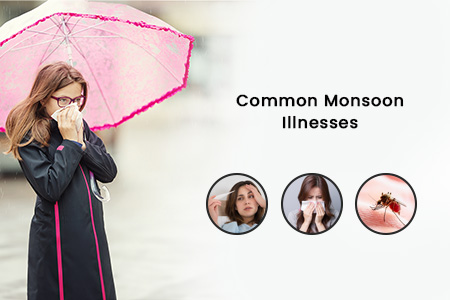2024-07-10
2024-04-12
2023-10-12
2023-09-13
2023-08-06
2023-08-04
2023-07-29
2023-07-05
2023-06-09
2023-02-03
2023-02-02
2023-01-06
2023-01-05
2023-01-04
2023-01-03
2023-01-02
2022-11-02
2022-07-30

India experiences annual showers from June to September, providing a much-needed respite from the sweltering heat. However, along with the relief, monsoons also bring about the spread of various illnesses and infections. Compared to other seasons, the monsoon period poses a higher risk of exposure to viruses, germs, and diseases.
By prioritizing basic hygiene, implementing preventive measures, seeking early and accurate diagnoses, and receiving proper treatment, both individuals and communities can remain healthy and protect themselves from infectious diseases during the monsoon season. By raising awareness, being prepared, and taking prompt action, we can minimize the impact of monsoon-related illnesses and ensure the well-being of everyone.
10 Most Common Monsoon Diseases
The following list highlights some of the diseases to be aware of during this muddy and rainy season:
Symptoms:
• High fever
• Swollen lymph nodes
• Rashes
• Headache
• Low palette count
• Hypersensitivity
Chikungunya fever is predominantly transmitted by mosquitoes that breed in stagnant water sources such as air conditioners, refrigerators, plants, utensils, and water pipes. To prevent the transmission of chikungunya, it is essential to eliminate stagnant water sources around your living and working areas. Regularly clean and maintain air conditioners, refrigerators, and utensils to prevent mosquito breeding grounds. Additionally, use mosquito repellents and protective clothing to minimize mosquito bites, especially during peak activity times.
Symptoms:
• Acute joint pain
• High fever
• Fatigue
• Chills
Malaria, the notorious disease prevalent during the monsoon season, is caused by the female Anopheles mosquito, which thrives in waterlogged areas. Its breeding grounds are often found in stagnant water. The symptoms of malaria are quite distinct, including weakness, chills, and fever. To protect yourself from malaria, it is crucial to take preventive measures. Avoiding mosquito bites is key, and you can achieve this by using mosquito repellents, wearing protective clothing that covers your body, and sleeping under mosquito nets.
Malaria Symptoms
• High fever
• Body ache
• Body Chills
• Sweating
• Severe anemia
Cholera is caused due to unhygienic practices in consumption of food and water. The most typical sign of this monsoon sickness is diarrhea and loose stools.
Symptoms:
• Low blood pressure
• Thirst
• Muscle cramps
• Rapid heart rate
• Dry mucous membrane
• Loss of skin elasticity
Typhoid is a water-borne illness that is often brought on by poor sanitation. This refers to consuming food and drink prepared or stored improperly.
Symptoms:
• Prolonged high fever
• Weakness
• Abdominal Pain
• Constipation
• Headaches
• Vomiting
Viral fevers are a common symptom throughout the year, but they are widespread during the monsoon season. Symptoms including high fever, a cold, and a cough are common. Viral fever duration could persist for three to seven days. Consult your doctor before any diagnosis.
Symptoms
• Fever
• Fatigue
• Dizziness
• Weakness
• Body chills
• Muscle, body, and joint pain
• Inflammation of the pharynx
Although this condition is not life-threatening, early precautions should be followed. For diagnosis, get a complete blood test. To stay hydrated, you should consume a lot of water and limit your intake of outside food. Additionally, try to avoid contacting affected persons.
The main cause of bowel disease is the consumption of unhygienic food and water. However, with proper care and precautions, diarrhea can be easily treated and prevented. There are two types of diarrhea: acute and chronic, both of which can be effectively managed.
To prevent this illness, the simplest and most effective strategy is to ensure the consumption of boiled water and properly cooked meals. Boiling water kills harmful bacteria and viruses, making it safe for drinking. Additionally, thorough cooking of food kills potential pathogens, reducing the risk of infection.
Symptoms
• Abdominal cramps or pain.
• Bloating
• Nausea
• Vomiting
• Fever
• Blood in the stool
To treat diarrhea, rehydration is usually necessary. You must consume more water or liquids that restore electrolytes, like sports drinks.
Leptospirosis, called Weil's illness, is carried on by touching contaminated water or muck. A bacterial ailment called leptospirosis is spread from animals to people. Many animals carry the organism into soil and water by their urine. The typical symptoms of this widely disseminated monsoon disease include
Symptoms
• Inflammation
• Chills
• Muscle discomfort
• Headaches
• Fever
To prevent contracting this illness, it is best to cover any scratches or bruises you may have before going outside.
In medical terms, stomach flu is sometimes known as viral gastroenteritis. It is a contagious illness that affects the stomach and intestines. Stomach illnesses resulting from using unhygienic food and beverage products are frequent during the monsoon season.
Symptoms
• Diarrhea
• Vomiting
• Nausea
• Fever
• Headache
• Abdominal pain
• Lack of appetite
On the other hand, taking the safe steps at the appropriate time will help you stay healthy during the monsoon. Understanding why our bodies are more susceptible to damage during the rainy season is essential, as is knowing how to stay secure and protected.
The weather changing and the temperature changing are the usual causes of this. You must guard against this illness since it has the potential to spread virally from one person to another.
Symptoms:
• Fever
• Aching muscles
• Sweating
• Headache
• Nasal congestion
• Sore throat
Sree Manju Hospital is equipped with experienced doctors who specialize in the prevention, treatment, and cure of various illnesses, including those related to bowel diseases such as diarrhea. Best Hospital in KPHB understands the significance of maintaining hygiene and emphasizes the importance of safe food and water practices. The doctors at Sree Manju Hospital, Best Hospital in KPHB work diligently to educate patients about the importance of hygiene, particularly in relation to food and water consumption. By promoting these practices, the hospital aims to prevent the occurrence of diarrhea.